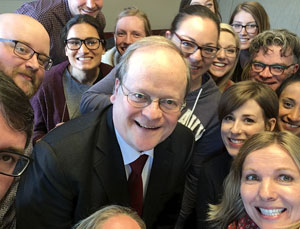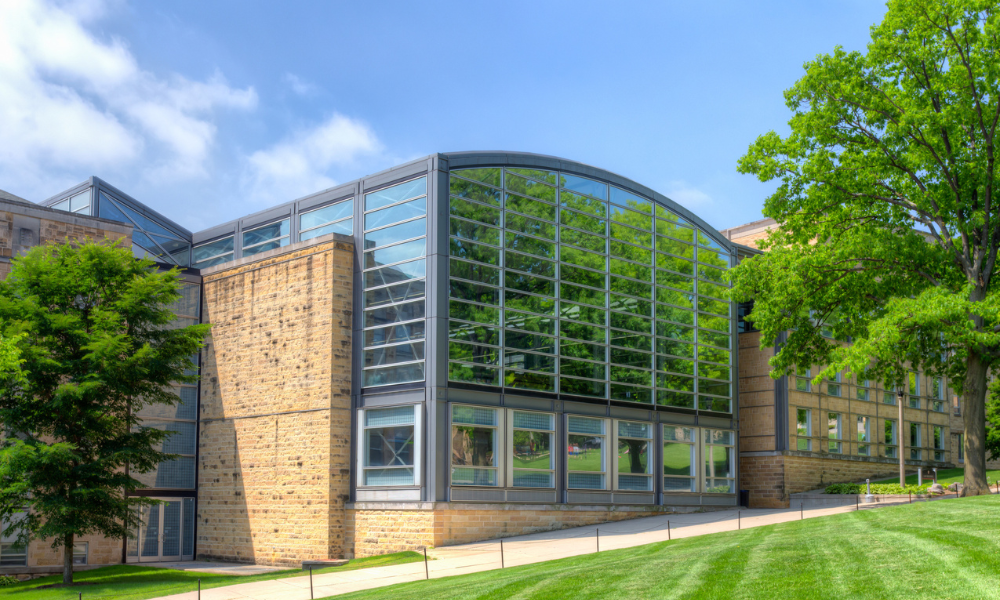
Judges, lawyers, law students and the public continue to grapple with the access to justice crisis that is far-reaching across the country. Too often, we lament that the system is too complex, too slow and too expensive. The most marginalized members of Canadian society experience significant barriers navigating the justice system on a daily basis.
So how do we move forward? What initiatives are currently underway to tackle access problems, and what role can law students play in improving access? On March 9, former Supreme Court of Canada justice Thomas Cromwell came to the University of Winnipeg’s Robson Hall to speak on this topic. Specifically, he talked about his instrumental work on the National Action Committee on Civil and Family Justice, and what he envisions the role of students and law schools to be in addressing issues of access to justice (A2J).
To be honest, critical engagement with and meaningful exposure to the access crisis is limited in law school. Thanks to Jeff Hirsch, a partner at Thompson Dorfman Sweatman LLP, who sits on the National Action Committee with Cromwell, a course specifically devoted to access to justice is now being offered at Robson Hall. I, along with many of my colleagues in the A2J course, have a genuine interest in learning more about access to justice and pursuing a legal career with an aim to fix some of the access problems.
The A2J course could have been your standard seminar course: Do the readings, come to class, answer questions posed by the professor and have a discussion with your peers. However, the course is much more dynamic and academically challenging, offering students a volunteer clinical placement with a local access to justice organization and the opportunity to hear from weekly guest speakers including practising lawyers, regulators, advocates and other access to justice innovators. We are encouraged to think critically about the current state of our justice system, consider potential solutions and to voice our own opinions.
I suspect everyone in the A2J course would agree that the highlight of this term has been the opportunity to speak with Cromwell. After all, it’s not every week we get to have a candid conversation with a former Supreme Court of Canada justice over lunch, not to mention a Kodak moment to remember the occasion (in which we sincerely thank him for participating!).
In his lecture, Cromwell gave the faculty an overview of the scope of the access to justice problem and the work of the National Action Committee. The committee brings together stakeholders working in different areas of the law, in different provinces and has created a comprehensive “roadmap” for transforming and improving the current state of access to justice. In particular, Cromwell highlighted the importance of putting the public first, by acknowledging their unique needs and experiences, engaging in public education and tailoring services and procedures with these needs in mind.
In a small group setting, students of the A2J course were able to have a more focused, and meaningful, discussion with Cromwell. We had the chance to voice our ideas about the access crisis, drawing on our own personal and professional experiences. We expressed our concerns about wanting alternative legal careers such as working with non-profits or starting our own practices with the aim of closing some of the access gaps. What I appreciated about speaking with Cromwell was that he took a genuine interest in our views. He acknowledged that, as the newest generation of lawyers with an opportunity to enact meaningful change, student debt is a disincentive for new lawyers to play an active part in making the system more flexible and more accessible.
A key takeaway from our conversation was the need for a culture shift; a “new way of thinking.” The former SCC justice and students wholeheartedly agreed that the problem of access to justice can only be dealt with meaningfully when stakeholders put their fear of change aside, begin to communicate with one another and commit to funding creative solutions. This must be done within the profession by unbundling legal services, and better utilization of technology and regulatory bodies. At the law school level, faculties must facilitate a learning environment where students are encouraged to participate in clinical opportunities and create their own initiatives that promote access to justice. According to Jasmine Bissoon, a second-year student, the gathering was a unique opportunity to discuss issues such as the future of online dispute resolution, satellite law offices and one-stop shop models with a “legal superstar in the access to justice world.”
Being exposed to some of the A2J literature and hearing from Cromwell, it’s obvious that access to justice is a complex and overwhelming problem. Solving it is an enormous but necessary undertaking. Rob Walichnowski, a third-year student who will soon begin his articles, reflected, “I was more convinced that the access to justice problem is one which will take a generation to overcome, and that as such, we must get to work.”
Madison Pearlman is a second-year law student at Robson Hall currently taking the Access to Justice perspective course. She can be contacted at [email protected].
So how do we move forward? What initiatives are currently underway to tackle access problems, and what role can law students play in improving access? On March 9, former Supreme Court of Canada justice Thomas Cromwell came to the University of Winnipeg’s Robson Hall to speak on this topic. Specifically, he talked about his instrumental work on the National Action Committee on Civil and Family Justice, and what he envisions the role of students and law schools to be in addressing issues of access to justice (A2J).
To be honest, critical engagement with and meaningful exposure to the access crisis is limited in law school. Thanks to Jeff Hirsch, a partner at Thompson Dorfman Sweatman LLP, who sits on the National Action Committee with Cromwell, a course specifically devoted to access to justice is now being offered at Robson Hall. I, along with many of my colleagues in the A2J course, have a genuine interest in learning more about access to justice and pursuing a legal career with an aim to fix some of the access problems.
The A2J course could have been your standard seminar course: Do the readings, come to class, answer questions posed by the professor and have a discussion with your peers. However, the course is much more dynamic and academically challenging, offering students a volunteer clinical placement with a local access to justice organization and the opportunity to hear from weekly guest speakers including practising lawyers, regulators, advocates and other access to justice innovators. We are encouraged to think critically about the current state of our justice system, consider potential solutions and to voice our own opinions.
I suspect everyone in the A2J course would agree that the highlight of this term has been the opportunity to speak with Cromwell. After all, it’s not every week we get to have a candid conversation with a former Supreme Court of Canada justice over lunch, not to mention a Kodak moment to remember the occasion (in which we sincerely thank him for participating!).
In his lecture, Cromwell gave the faculty an overview of the scope of the access to justice problem and the work of the National Action Committee. The committee brings together stakeholders working in different areas of the law, in different provinces and has created a comprehensive “roadmap” for transforming and improving the current state of access to justice. In particular, Cromwell highlighted the importance of putting the public first, by acknowledging their unique needs and experiences, engaging in public education and tailoring services and procedures with these needs in mind.
In a small group setting, students of the A2J course were able to have a more focused, and meaningful, discussion with Cromwell. We had the chance to voice our ideas about the access crisis, drawing on our own personal and professional experiences. We expressed our concerns about wanting alternative legal careers such as working with non-profits or starting our own practices with the aim of closing some of the access gaps. What I appreciated about speaking with Cromwell was that he took a genuine interest in our views. He acknowledged that, as the newest generation of lawyers with an opportunity to enact meaningful change, student debt is a disincentive for new lawyers to play an active part in making the system more flexible and more accessible.
A key takeaway from our conversation was the need for a culture shift; a “new way of thinking.” The former SCC justice and students wholeheartedly agreed that the problem of access to justice can only be dealt with meaningfully when stakeholders put their fear of change aside, begin to communicate with one another and commit to funding creative solutions. This must be done within the profession by unbundling legal services, and better utilization of technology and regulatory bodies. At the law school level, faculties must facilitate a learning environment where students are encouraged to participate in clinical opportunities and create their own initiatives that promote access to justice. According to Jasmine Bissoon, a second-year student, the gathering was a unique opportunity to discuss issues such as the future of online dispute resolution, satellite law offices and one-stop shop models with a “legal superstar in the access to justice world.”
Being exposed to some of the A2J literature and hearing from Cromwell, it’s obvious that access to justice is a complex and overwhelming problem. Solving it is an enormous but necessary undertaking. Rob Walichnowski, a third-year student who will soon begin his articles, reflected, “I was more convinced that the access to justice problem is one which will take a generation to overcome, and that as such, we must get to work.”
Madison Pearlman is a second-year law student at Robson Hall currently taking the Access to Justice perspective course. She can be contacted at [email protected].







